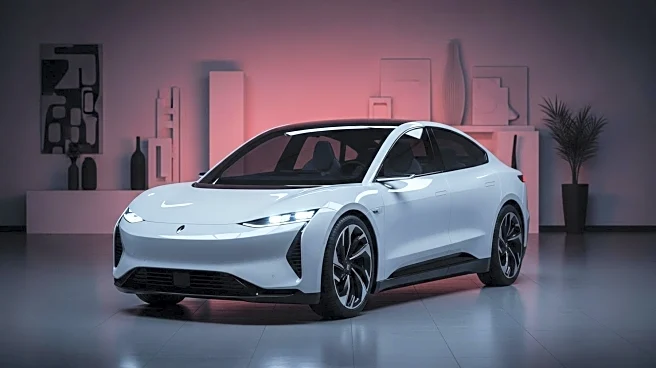What is the story about?
What's Happening?
Nissan is experiencing significant sales declines across major markets, including China and Japan. In China, sales fell by 18% to 270,000 units in the first half of the year, marking a substantial drop from its peak sales of 720,000 units in 2018. Japan also saw a 10% decrease in sales, reaching the lowest domestic sales figure since 1993 with 220,000 units sold. Globally, Nissan has dropped out of the top 10 in auto sales for the first time in 16 years, with a 6% decrease to 1.61 million vehicles sold. This decline has allowed competitors like BYD and Geely to surpass Nissan, with BYD achieving a 33% increase in sales. Additionally, Suzuki has outsold Nissan for the first time since 2004. Despite these challenges, Nissan is launching new models, including the Leaf EV in the US and the N7 EV sedan in China, to revitalize its lineup.
Why It's Important?
The decline in Nissan's sales is significant for the global automotive industry, as it reflects shifting market dynamics and increased competition from Chinese automakers. Nissan's struggles highlight the challenges faced by traditional automakers in adapting to changing consumer preferences and the growing demand for electric vehicles. The company's efforts to introduce new models and revamp its lineup are crucial for its recovery and competitiveness. The sales drop also impacts Nissan's financial health, as evidenced by its fourth consecutive quarterly loss. This situation underscores the importance of innovation and strategic adaptation in the automotive sector, where companies must navigate economic pressures and evolving market trends.
What's Next?
Nissan is focusing on launching new models to regain market share and improve its financial performance. The introduction of the Leaf EV in the US and the N7 EV sedan in China are part of its strategy to boost sales. The company plans to revive the Xterra SUV with a V-6 hybrid powertrain by 2028, aiming to attract consumers interested in rugged and eco-friendly vehicles. Nissan's future actions will likely involve further expansion of its electric vehicle offerings and strategic partnerships to enhance its market position. Stakeholders, including investors and industry analysts, will closely monitor Nissan's progress and response to competitive pressures.
Beyond the Headlines
Nissan's sales decline may have broader implications for the automotive industry, particularly in terms of the shift towards electric vehicles and sustainable practices. The company's challenges could prompt other automakers to reassess their strategies and accelerate their transition to electric mobility. Additionally, Nissan's situation may influence regulatory policies and consumer perceptions regarding traditional automakers' ability to innovate and adapt. The competitive landscape in the automotive sector is evolving, with new entrants and established players vying for market dominance, potentially leading to increased collaborations and technological advancements.

















